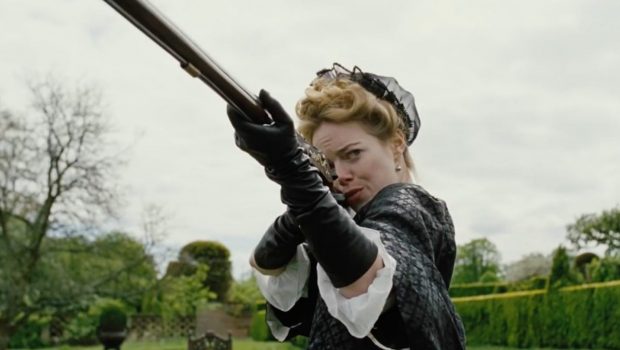The Favourite – Film Review
Reviewed by Harris Dang on the 25th of December 2018
20th Century Fox presents a film by Yorgos Lanthimos
Produced by Ceci Dempsey, Ed Guiney, Lee Magiday and Yorgos Lanthimos
Written by Deborah Davis and Tony McNamara
Starring Olivia Colman, Rachel Weisz, Emma Stone, Nicholas Hoult, Joe Alwyn, James Smith and Mark Gatiss
Edited by Yorgos Mavropsaridis
Running Time: 119 minutes
Rating: MA15+
Release Date: the 26th of December 2018
Idiosyncratic director Yorgos Lanthimos has garnered quite a reputation over the past decade. He is best known for his bizarre films, including the faux-dystopian comedy-drama Dogtooth (2009), the pitch-black romantic comedy The Lobster (2015) and the revenge fable The Killing of a Sacred Deer (2017). His work has continued to explore the dark nature of the human condition through an uncompromising and absurdist lens.
The Favourite marks many firsts for Lanthimos. It is the first film where he has had no input in the script. Instead, it is written by debut screenwriter Deborah Davis and Australian filmmaker Tony McNamara, who has contributed to various Australian television shows, such as The Secret Life of Us and Doctor Doctor and has directed films as such The Rage in Placid Lake (2003) and Ashby (2015).
The Favourite is also Lanthimos’ first film based on a true story. It is about the behind‑the‑scenes politics between two cousins jockeying to be court favourites during the reign of Queen Anne in the early 18th century. Finally, it is his first film that exclusively revolves around female leads (although his underrated film Alps comes close) and female gender dynamics. Will the change of pace with be beneficial to Lanthimos’ evolving filmography or should he return to his proven formula?
The film takes place during a war between England and France. A physically and emotionally frail Queen Anne (Olivia Colman) occupies the throne. Her close friend, Lady Sarah (Rachel Weisz), governs the country in her stead while tending to Anne’s ill health, mercurial temper and her tragic past. When a new servant arrives, the indigent Abigail (Emma Stone), her charm endears her to Sarah who is her cousin. After Sarah takes Abigail under her wing, Abigail sees a chance to return to her aristocratic roots.
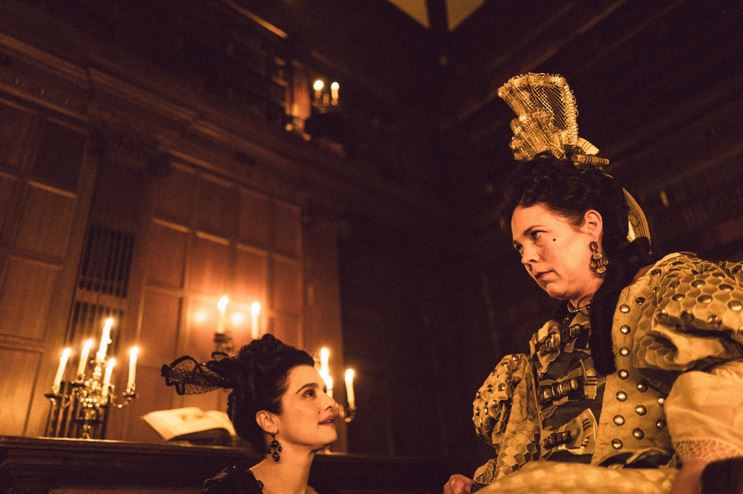
This critic has found many of Lanthimos’ films incredibly funny because of their absurdist views of the darkest facades of human nature. It is a shock to see that The Favourite is not only Lanthimos’ funniest film but also his most accessible and the most remarkably humane. The script is the biggest signpost that it will depart from his previous work. Compared to the slow, deadpan humour of his other features, the lines here are uttered and screamed at the speed of light; and all of it is pure gold.
The script by Deborah Davis and Tony McNamara is naughty and nefarious in its comedy and drama. Every line of dialogue seethes with emotion and the script is not above coarse language; it invents new terms and brings old terms back into the mainstream. The script also provides amply complex characterisations for the three female leads that never feel exploitative, cliched, condescending or tone-deaf. Even the one prominent moment of female nudity was Emma Stone’s idea.
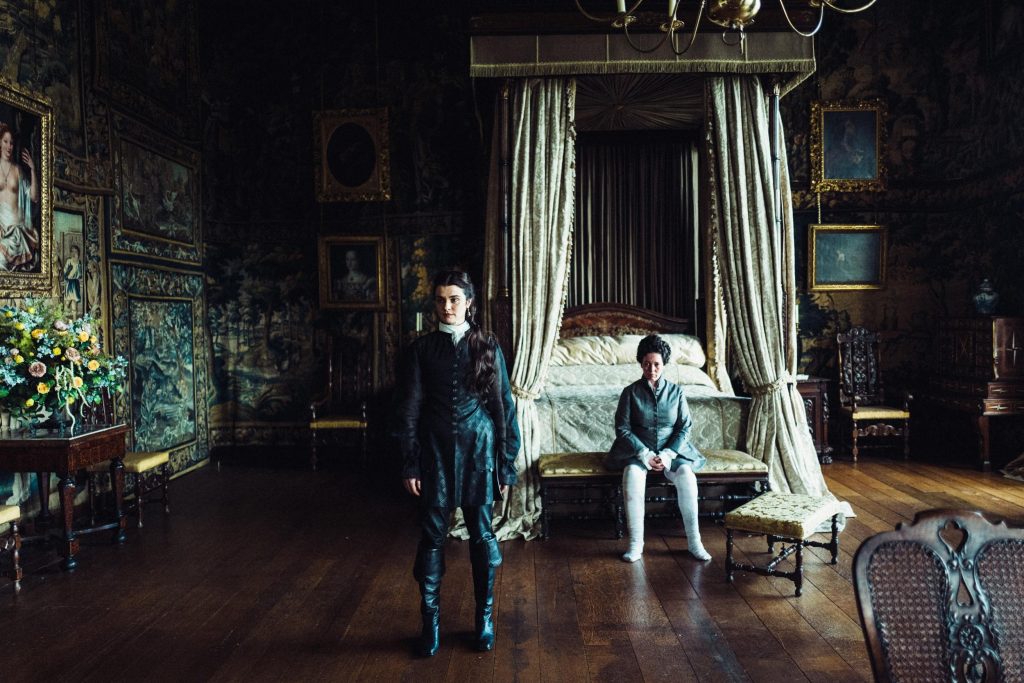
Queen Anne appears clueless and petulant, but it stems from a dark, tragic past that involves many deaths of her loved ones, transposed into her many pet rabbits, which adds surrealism to the film and a plausible visual shorthand. The solid rock of the three, Lady Sarah, may at first seem controlling, mean-spirited and brutally honest. However, it does not stem from a lust for power but other factors, including social standing and love.
The outsider of the three, Abigail, resembles a woman with a positive disposition and an optimistic view, given her complicated circumstances. Yet her motives and her past actions signal otherwise. All three women have one thing in common: they are saddled with a dramatic backbone and are trapped with the cards with which they are dealt.
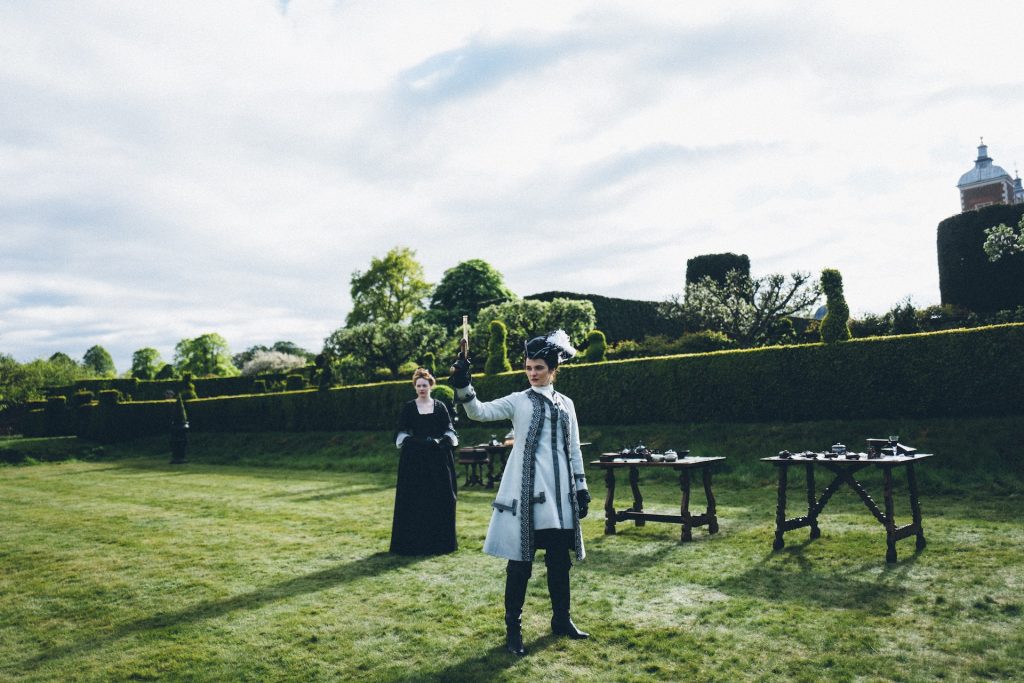
The female roles are so well-written that the male characters seem peripheral and insignificant. Lanthimos and his screenwriters turn that detriment into a positive by making the male roles entertaining punchlines that stand out more than they could have if they were full-bodied characters. With full-blown wigs, splashes of make-up and moments of flamboyant, yet hilariously human behaviour, Harley and Masham, played by Nicholas Hoult and Joe Alwyn, respectively, are both uproarious caricatures. They are clearly having the time of the lives playing caricatures that are both manipulative and manipulated.
The characters and the script are unhinged and so is the filmmaking style. The crisp editing by Yorgos Mavropsaidis is surprisingly fast-paced compared to his contributions on other Lanthimos films. It adds to the timing and punch of the humour and subverts genre tropes of period dramas. These stories often rely on wide-angle shots, sterile compositions and static camera movement so the audience witnesses the opulent settings in all their majesty. The Favourite’s camerawork, lensed by acclaimed cinematographer Robbie Ryan, is comparatively free-flowing, intrusive and almost voyeuristic. It adds to the debauchery of the humour and drama too.
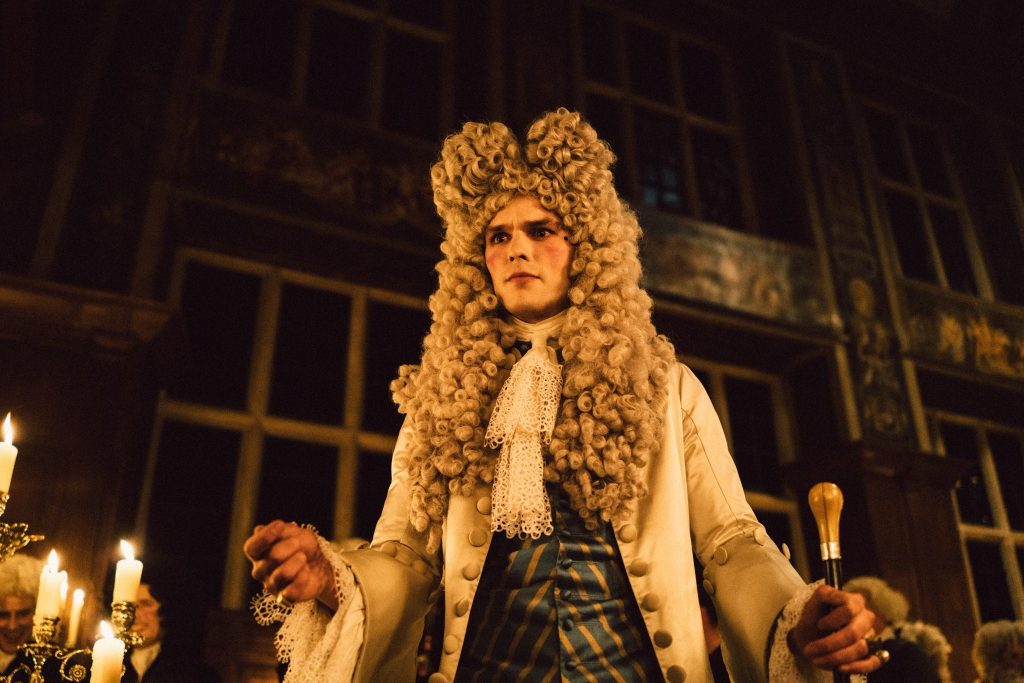
In the case of the humour, many of the shots (showcasing the brilliant set design by Alice Felton) are reminiscent of CCTV security footage (especially shots set in the kitchen with the servants) in that it accentuates the humour and the politics of the film by giving it a contemporary edge. In the case of the drama, the use of the fish-eye lens provides a compelling juxtaposition of spaces. It captures the entirety of the vast settings, which is then contrasted with intensely claustrophobic shots. It adds to the film’s thematic spine where the lead characters feel powerful but are relegated to their current positions in life. Meanwhile, the natural lighting (sourced only from sunlight and candles) aids the voyeuristic cinematography by adding a sense of beauty, surrealism and a sense of dramatic exposure that peels away the characters’ layers.
The sparse use of makeup (led by Beverly Benda) and costume design (by the talented Sandy Powell) subverts gender expectations. The women are mostly makeup free, which conveys their roles as emotionally honest. The men, however, are caked in makeup to the point that they appear fake. It complements the physical acting, such as how Queen Anne walks through the hallway, showing her emotionally delicate state. The colours of the costumes also infer revelations about the nature of the characters. At first, Abigail is dressed in black-and-white, which throws the dichotomy of right and wrong down on its head. Yet in the third act she is caked in makeup.
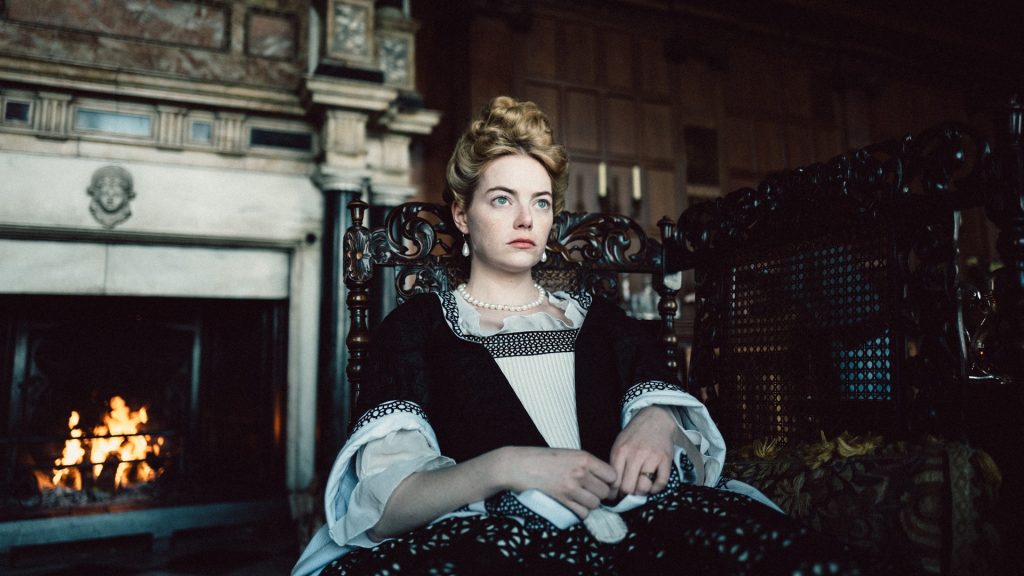
The three leads sink their teeth into these roles with gusto. They compete against each other in the story and complement each other on-screen. Olivia Colman has always been a fantastic dramatic actress and a skilled comedienne. Her role as Queen Anne combines these skills to create an impressive performance that could have been disastrous if poorly executed. If she was too sulky, it could have been annoying. If the performance was too brooding, it would have been problematic in relation to Lanthimos’ established filmmaking. Thankfully, Colman strikes a perfect balance and makes Queen Anne a compellingly flawed human being.
Rachel Weisz is the most established actress out of the three, so her performance is comparatively less surprising. This does not detract from the power of her work. She entertainingly portrays Lady Sarah as compellingly headstrong, honest, and a prominent figure who grounds the film before it delves too far into farce.
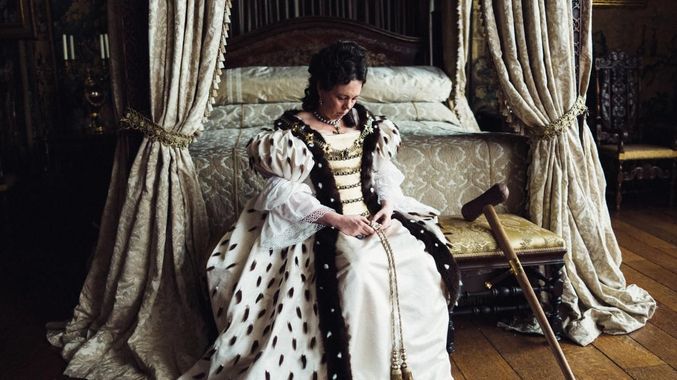
The biggest surprise is Emma Stone. Saddled with the least acting experience, being the cast’s only American actor and having the motivation of something to prove, Stone has the hardest role. Her filmography has seen her play characters with sunny dispositions, but here she is given a character that subverts that trait advantageously. She expands her acting range incredibly well (including adopting a well-executed English accent), especially when revealing her true nature, particularly towards the male characters.
The Favourite is not only one of the funniest films of the year, but it is one of the best films of the year, period. With its brilliantly acerbic and dramatic script, a trio of wonderful performances from its actresses, hilarious caricatures from its actors, a strong thematic and dramatic backbone, wonderful production design contributions and strikingly off-kilter cinematography, this is my front-runner for the Best Picture Oscar. It is absolutely brilliant.
Summary: The Favourite is not only one of the funniest films of the year, but it is one of the best films of the year, period. It is my front-runner for the Best Picture Oscar.


